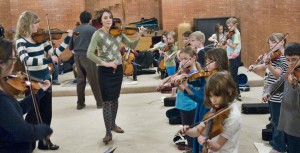Teaching Philosophy Statement
“Teaching is the highest form of understanding.”
Aristotle (385 BC-322 BC)
Educational Philosophy: Guiding Principles
My beliefs about the role of education in human lives closely resonate with the “whole person approach” that originated in Jean-Jacques Rousseau’s (1721-1778) seminal treatise, Emile, or On Education. This approach suggests that in order to enable students to reach their full potential education needs to be holistic and encompassing. I find these beliefs relevant to today’s world and education for number of reasons, two of which are explained below:
- We live in a global economy era in which strong foundations in reading, writing, and mathematics may not be sufficient for lifelong success. In addition to preparing students to think both critically and creatively, to analyze and evaluate massive amounts of information that is available all around them, to solve problems, and to communicate well, education needs to provide students with opportunities to develop aesthetic sensitivity that is cultivated through music and other arts education. I believe that such education has the potential to evolve the quality of students’ lives from a level of existing for basics to the level of living for purpose. This is the source of my attraction towards liberal arts education and teaching at Pacific University.
- The “whole person approach” to education also implies a three-fold role of education. The fully educated individual is well rounded in all three domains of human being: cognitive (thinking), psychomotor (physical), and affective (emotional) domains. This idea was elegantly summarized and stated over a hundred years ago in a well known “Three Hs” motto, “Learning by Head, Hands, and Heart,” coined by Swiss pedagogue and educational reformer, Jean Heinrich Pestalozzi (1746-1827). Music, by its holistic nature, has the capacity to address all of the three above-stated domains of human being in the most balanced way. This quality of music is the source of my keen interest in teaching music as an equally important and integral subject to a quality education.
I also believe that students deserve only the best in education and that is why I dedicate time, energy, and other means to my ongoing professional development so that students in my classes may be exposed to the most current and best educational practices not only in my area of expertise but in education in general. Additionally, I strongly believe that high quality education is the right of every human being and that is why I gladly employ my time and share my expertise with educational services that are promoting equality and justice.
Teaching Philosophy: Guiding Principles
The combination of accumulated content expertise and proficiency in pedagogical delivery of knowledge, skills, and behaviors in my area of expertise, along with my keen interest in objectives that concern educational psychology, such as learning and motivation theories, and the rich teaching experience I have accumulated over past twenty years, all shaped my current approach to teaching and learning. My teaching philosophy, at this point of my professional evolution, can be distilled down to two guiding principles that will be explained as follows:
- In my view, my main role as a teacher is to structure knowledge and skills (learning objectives) that my students need to learn in a way that acquired knowledge and skills become explainable, understandable, and learnable, rather than just to convey information, to explain, and demonstrate objectives to students. Based on my experiences in teaching, highly structured presentations of content knowledge and skills as well as a highly structured pedagogical delivery has the potential to result in observable and measurable learning outcomes, whether cognitive, psychomotor, and/or affective. I would argue that development of observable and measurable skills rather than content knowledge is the essence of learning. This is what guides my long and detailed preparations for every course and every class.
- I also place a high priority on teaching my students how to spark and sustain motivation to learn, on teaching metacognitive strategies, on teaching ways to seek new knowledge and understandings, and on teaching how to mindfully observe their progress so that they can become life-long learners whose interest in personal and professional growth never ceases. This is what guides my mini-presentations that focus on general education that I provide for students in all courses that I teach
I also believe in the importance of advancing the student-teacher relationship to mentoring relationships as my readings on mentoring and informal conversations with colleagues with more experiences in teaching inform me that mentoring relationships seem to be the key ingredient in making lasting positive difference in students’ college and post graduation lives. This is what guides my efforts to learn more about mentoring through my research on mentoring at Elon University. Additionally, I believe that teachers need to be not only passionate about their academic disciplines, about teaching, about students, but also to be visionary leaders with an eye on a better future for humanity so that their vision and passion may serve as a guideline for the development of their students into visionary leaders of the future. This is what guides my leadership services to my present professional organizations and my advising services to a number of student organizations and clubs.

Leave a comment